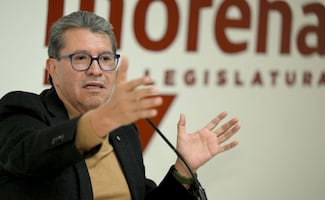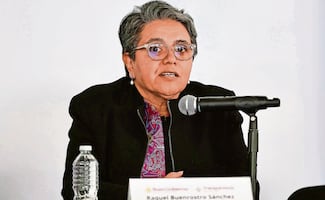Más Información

En SLP nunca ha existido una gobernadora y ahora hay una posibilidad real que así sea, asegura Ricardo Gallardo tras aprobación de "Ley Esposa"

Morena analiza disminución de pluris y elección popular de consejeros del INE: Monreal; serán revisadas en la reforma electoral, dice

Rastro de jets vinculados al narcotráfico lleva a un vendedor en California… y a un punto ciego de la regulación aérea en Estados Unidos

Secretaría Anticorrupción sanciona a dos empresas por buscar contratos con información falsa; imponen multa de miles de pesos

Banxico se despide de 2025 con otro recorte a la tasa de interés; queda en 7% por ajuste de 25 puntos base
The figures are only a pale reflection of people’s suffering in Venezuela , yet they are still striking: In January, hyperinflation amounted to 84.2% and the prices in the troubled South American country rose 4,068% in the previous 12 months, according to the opposition parties.
The monthly figure conveys an annualized inflation over 150,000% and prices doubling at least every 35 days, according to a report released on February 7 by the former Parliament’s Economic Development and Finance Committee . “Venezuelans are trapped in their worst economic tragedy. They cannot buy nor fulfill their families’ needs through hard work”, said Rafael Guzmán , Head of the Committee .
For its part, the International Monetary Fund ( IMF ) sees Venezuelan inflation spiraling to 13,000% this year after price increases surpassed 2,400% in 2017 . Furthermore, the IMF expects an inflation rate of 2,350% while an economy 15% contraction , adding to a cumulative GDP decline of nearly 50% since 2013.
The government of President Nicolás Maduro has not published inflation data since December 2015, yet it has increased the minimum wage repeatedly in a nod to rising prices , but the last 40% surge announced on January 1 is roughly equivalent to over one dollar per month (797,510 bolivars).
Decades of mismanagement and oil dependency, dating back at least to the populist President Carlos Andres Pérez ’ first term in the 70s and the Hugo Chávez B olivarian experiment ( 2002-2013 ) are taking a worrisome toll.
A recent survey carried out by the country’s leading universities to 6,500 families found that 93% did not have enough money to buy food . “The most desperate are forced to pick through rubbish bins to find food . [...] Increasingly, middle-class families are resorting to s elling off their belongings to make ends meet,” described the British newspaper The Guardian .
It should be noted that while regional neighbors such as Ecuador are recovering from recession due to higher oil prices, Venezuela’s main source of foreign income is dwindling.
This week, a monthly report by OPEC ( Organization of the Petroleum Exporting Countries ) said that the country’s oil output in January fell to its lowest level in nearly 30 years , without taking into account a brief oil strike in 2003.
Venezuela
pumped 1.6 million barrels per day (bpd), down 20% in comparison with the same month last year, even though the country has the biggest world’s reserves and crude oil alone makes about 95% of its exports , the state-owned company Petróleos de Venezuela, S.A. ( PDVSA ), has pumped less and less oil in the last years as a result of corruption, crumbling infrastructure, and a debt crisis.
United States Secretary of State Rex Tillerson
said on his recent tour to Mexico and other Latin American countries that Washington is still considering a ban on Venezuelan crude oil exports to the U.S.
Deep political consequences
Overall, Venezuela is facing today the world’s worst inflation crisis , in a dire situation reminiscent of Zimbabwe’s hyperinflation episode ( 2007-2008 ) or the G erman hyperinflation during the Weimar Republic ( 1923 ).
Both cases had deep political consequences, for instance in the once-rich African nation, it marked the end of the post-independence consensus around the leadership of President Robert Mugabe , finally deposed in November while the ravaging poverty and social chaos spearheaded by the Deutsche Mark ’s loss of value led to the rise of the dictatorship of Adolf Hitler in Germany .
In the Venezuelan crisis, given the failure of the U.S. and its allies to promote a “regime change” in Caracas supporting the intense street protests of 2016-2017, there is little hope in the April 22 election .
On December 10, 2017, after stripping the opposition-held National Assembly of its legislative powers—the body was replaced by a newly elected Constituent National Assembly ,—Maduro announced that the main opposition parties would be banned from taking part in the process because they boycotted gubernatorial elections.
The very same day, his United Socialist Party of Venezuela ( PSUV ) scored an easy victory in municipal polls, winning nearly 90% of the 335 mayoral seats.
At the moment, it is unclear who would stand against Maduro from the fragmented opposition. Its most popular leaders, members of the coalition Democratic Unity Roundtable ( MUD ), namely Leopoldo López , Antonio Ledezma , and Henrique Capriles are jailed, in exile, or barred from holding office. Venezuela’s Constitution dictates that a new six-year presidential term must begin in January 2019.
Edited by
More by
Noticias según tus intereses
[Publicidad]
[Publicidad]









